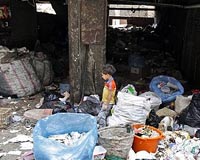| . |  |
. |
London (UPI) Oct 9, 2009 Greenpeace is locked in a legal battle with Trafigura, a London-based oil trader, over the dumping of toxic waste in Ivory Coast in 2006 that poisoned thousands of people and killed 15. The case highlights a dangerous spinoff of the global resources boom: the smuggling of huge amounts of dangerous waste from Europe to the poor countries of the Third World. In September Trafigura agreed to pay $48 million to settle compensation claims for the dumping after the British Broadcasting Corp. and London's Guardian newspaper disclosed internal company e-mail messages that revealed a coverup during three years of litigation in which Trafigura denied all liability. But Greenpeace said it would continue its legal action against the company in British courts and wants Trafigura prosecuted for manslaughter and causing grievous bodily harm. Trafigura Director Eric de Turckheim claimed after the $48 million deal was announced: "This settlement completely vindicates Trafigura." The company had already agreed to pay $160 million to the Ivory Coast government for a cleanup operation but did not admit legal liability then either for the alleged dumping of hundreds of tons of oil waste. The high-profile case has turned the spotlight on how the illegal export of industrial waste by Europe and the United States to impoverished countries in Africa, Asia and Latin America has become a vast and lucrative business. Companies do this to dodge high taxation on waste or laws that mandate it be disposed of in an environmentally responsible way, which can be an expensive undertaking. The European Union has approved legislation to prevent electronic waste -- discarded or obsolete computers, television sets, household electronics and circuit boards -- being dumped in Africa and elsewhere. These contain mercury, lead and other poisonous toxins. But under these environmental laws, based on the 1992 Basel Convention, it is four times more expensive to burn such waste in the Netherlands as it is to illegally have it shipped to Africa or Asia. DanWatch, a Danish watchdog group, says that 6.6 million tons of unaccounted e-waste is shipped from EU states every year. Only 25 percent of the estimated 8.7 million tons of e-waste produced by European consumers every year is actually recycled by qualified companies. The rest is taken by unscrupulous traders who have built up a highly profitable business making all this waste disappear overseas. Much of this traffic runs through the Dutch port of Rotterdam, the busiest port in Europe. DanWatch warned that "a hidden flow of end-of-life electronics is threatening to drown West Africa" as European companies exploit a loophole in European legislation that allows "end of life" electronics to be exported as working products. Consumer and environmental watchdog groups have called for tighter government monitoring and greater corporate care to prevent large-scale dumping in the developing world. But that has not stopped the dumping, every month, of 500,000 cast-off computers in Nigeria, where they are piled up in mountains of junk in poor urban areas. In the Trafigura case being fought out in London, more than 30,000 people were affected by the toxic waste carried by the Probo Koala, a chartered Panamanian tanker, to the Ivory Coast where it docked at the port of Abidjan on Aug. 19, 2006. According to an analysis of samples of the waste carried out on the tanker in Amsterdam before it sailed for Africa, it contained approximately 2 tons of hydrogen sulphide, a lethal gas that smells like rotten eggs. In Abidjan, convoys of trucks carried the 400 tons of sludge-like waste from the tanker to 18 sites around the city. According to the Guardian and the BBC, as many as 100,000 Ivorians fell sick in the weeks that followed. Fifteen died. A local contractor and a port official were convicted and imprisoned in Abidjan over the dumping. Trafigura also faces possible prosecution in Amsterdam for illegally exporting toxic waste. The day the Guardian published Trafigura's e-mail messages, it also reported the discovery of shipwreck off the Italian coast following a tip from a member of the mafia. It was found to be carrying drums of nuclear waste, apparently from Norway. The mafia, which had reportedly been paid $150,000 to get rid of the waste that no one wanted to handle, used explosives to scuttle the ship and its killer cargo. Share This Article With Planet Earth
Related Links Our Polluted World and Cleaning It Up
 In Egypt, swine flu fears buried under rubbish threat
In Egypt, swine flu fears buried under rubbish threatCairo (AFP) Oct 2, 2009 "Look, that's where the swine flu is going to come from," said a weary Marzouka Beshir, pointing to a pile of rubbish rotting under the blazing sun in Imbaba, a working class neighbourhood in Cairo. In their overcrowded areas, overflowing with litter, many like this 52-year-old Egyptian woman, have trouble coming to grips with the dramatic measures taken by authorities to combat the A(H1N1) ... read more |
|
| The content herein, unless otherwise known to be public domain, are Copyright 1995-2009 - SpaceDaily. AFP and UPI Wire Stories are copyright Agence France-Presse and United Press International. ESA Portal Reports are copyright European Space Agency. All NASA sourced material is public domain. Additional copyrights may apply in whole or part to other bona fide parties. Advertising does not imply endorsement,agreement or approval of any opinions, statements or information provided by SpaceDaily on any Web page published or hosted by SpaceDaily. Privacy Statement |